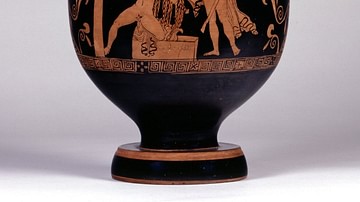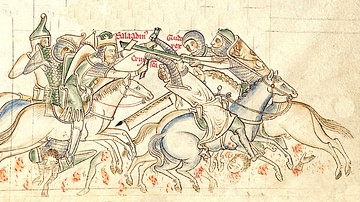Search Definitions
Browse Content (p. 166)

Definition
Macedon
Macedon was an ancient kingdom located in the north of the Greek peninsula first inhabited by the Mackednoi tribe who, according to Herodotus, were the first to call themselves 'Hellenes' (later applied to all Greeks) and who gave the land...

Definition
Roman Invective
Roman invective (uituperatio lat.) was the rhetorical and literary genre that aimed at systematically and publicly blaming a political foe to set him aside from the whole community and turn the audience against him during judicial, forensic...

Definition
Lagertha
Lagertha (also spelt Lathgertha or Ladgerda) is a legendary Viking shieldmaiden known from Saxo Grammaticus' early 13th-century CE Gesta Danorum. In this work, written in Latin and concerning Danish history, she is the first wife of Ragnar...

Definition
Crusader States
The Crusader States (aka the Latin East or Outremer) were created after the First Crusade (1095-1102) in order to keep hold of the territorial gains made by Christian armies in the Middle East. The four small states were the Kingdom of Jerusalem...

Definition
The Eumenides
The Eumenides is a play written by Aeschylus (c 525 – 455 BCE), the “Father of Greek Tragedy,” the most popular and influential of all tragedians of his era. The Eumenides was the third play of a trilogy, The Oresteia, with the remaining...

Definition
Mythology
Myths are a part of every culture in the world and are used to explain natural phenomena, where a people came from and how their civilization developed, and why things happen as they do. At their most basic level, myths comfort by giving...

Definition
Battle of Hattin - Saladin's Greatest Victory
The Battle of Hattin in July 1187 CE in present-day Israel was one of the great victories of Saladin, the Sultan of Egypt and Syria (r. 1174-1193 CE). The army of the Kingdom of Jerusalem and its Latin allies were totally defeated and, shortly...

Definition
Castles of Bellinzona
The Castles of Bellinzona are a set of three medieval fortifications located in and surrounding the city of Bellinzona, which is located in Canton Ticino, Switzerland. These castles are the only remaining examples in the Alpine region of...

Definition
Kingdom of Israel
The Kingdom of Israel occupied that part of the land on the Mediterranean Sea known as the Levant which corresponds roughly to the State of Israel of modern times. The region was known, historically, as part of Canaan, as Phoenicia, as Palestine...

Definition
Palestine
Palestine in the ancient world was part of the region known as Canaan where the Kingdoms of Israel and Judah were located. The term `Palestine' was originally a designation of an area of land in southern Canaan which the people known as the...